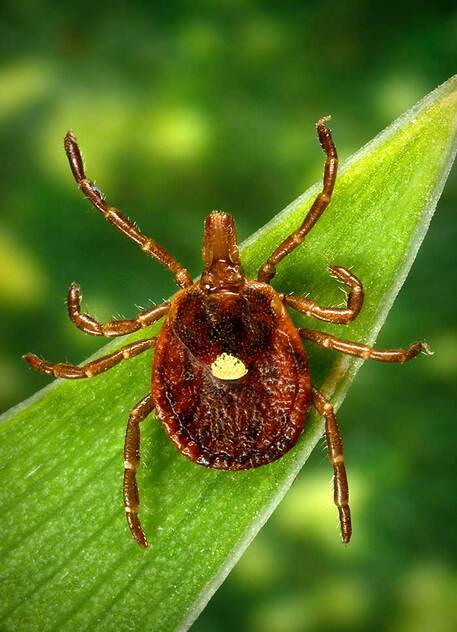This quarter, we share some timely news from an agency that is not one of our VMN sponsors, but is a trusted source of information on a subject that greatly affects Virginia Master Naturalists - ticks!
Lone Star Ticks and the Heartland Virus
--Contributed by David Gaines, State Public Health Entomologist, Virginia Department of Health
Last Friday (March 24th) three members of our vector-borne disease team at the Virginia Department of Health (VDH) spent an hour doing a tick survey at a park in Henrico County where we were able to collect 10 adult-stage, and six nymph-stage lone star ticks. Therefore, it appears that the season for tick-borne disease transmission is already upon us here in Virginia. Lone star ticks (Amblyomma americanum), are, by far, the most common cause of tick bites to people in areas of Virginia east of the Blue Ridge and in any areas of Virginia that are below 1,400 ft elevation. Furthermore, lone star ticks may remain active in the field fairly late into the season, as one of our epidemiologists identified Virginia’s first recorded case of Heartland virus in November of 2021. This illness resulted in the hospitalization and death of a man in his late 60s, and we believe that he was exposed to Heartland virus through the bites of infected larval-stage lone star ticks, or possibly to the bites of larval-stage Asian long-horned ticks, while he was hiking on his Piedmont farm in late October. We found both species of ticks to be present when we surveyed for ticks around the hiked area on his farm the following June.
The Heartland virus has probably been in Virginia for as long as lone star ticks have been here, but was not recognized as a human pathogen until 2012 when the CDC identified its first Heartland virus case in a Missouri patient. Since then, Heartland virus cases have been identified in numerous midwestern states surrounding Missouri, as well as in Virginia’s neighboring states of Tennessee, Kentucky and North Carolina. A Heartland virus illness produces many of the same symptoms that are associated with ehrlichiosis, but as it is a viral infection, patients do not respond to the antibiotic therapy prescribed for ehrlichiosis. As symptoms of Ehrlichiosis can also have some similarities to those of Rocky Mountain spotted fever, the attending doctor decided to test the patient for Rocky Mountain spotted fever (RMSF), and as this test was positive, and RMSF is a reportable disease, it was reported to our Epidemiology program at the Virginia Department of Health. That same day, on seeing the report, one of our astute vector-borne disease epidemiologists requested that the hospital put the remnant RMSF-positive serum sample in a -80 freezer, and then send it on dry ice to the CDC Arboviral Diseases Branch for Heartland virus testing. Note: Lone star ticks commonly carry a non-pathogenic Rickettsial agent called Rickettsia amblyommatus which causes patients to test positive on testing for RMSF.
Unfortunately, the following day, the patient died of his illness, and when the CDC received the remnant serum sample requested by our epidemiologist, it tested positive for the Heartland virus. Therefore, in addition to ehrlichiosis, alpha-gal syndrome, tularemia, and Rocky Mountain spotted fever, Virginia citizens and doctors now have one more recognized illness associated with lone star tick bites that they need to be aware of. The Heartland virus is mainly associated with lone star ticks, but laboratory evidence has shown that Asian long-horned ticks (Haemaphysalis longicornis) can also be infected with the Heartland virus. Furthermore, Asian long-horned ticks are known to transmit a related virus to people in Asia that is known as the “Severe Fever with Thrombocytopenia Syndrome virus” (SFTS virus). The SFTS virus is known to annually result in a number of fatal illnesses in older-aged patients in East Asia.
Additional Resources
--Contributed by David Gaines, State Public Health Entomologist, Virginia Department of Health
Last Friday (March 24th) three members of our vector-borne disease team at the Virginia Department of Health (VDH) spent an hour doing a tick survey at a park in Henrico County where we were able to collect 10 adult-stage, and six nymph-stage lone star ticks. Therefore, it appears that the season for tick-borne disease transmission is already upon us here in Virginia. Lone star ticks (Amblyomma americanum), are, by far, the most common cause of tick bites to people in areas of Virginia east of the Blue Ridge and in any areas of Virginia that are below 1,400 ft elevation. Furthermore, lone star ticks may remain active in the field fairly late into the season, as one of our epidemiologists identified Virginia’s first recorded case of Heartland virus in November of 2021. This illness resulted in the hospitalization and death of a man in his late 60s, and we believe that he was exposed to Heartland virus through the bites of infected larval-stage lone star ticks, or possibly to the bites of larval-stage Asian long-horned ticks, while he was hiking on his Piedmont farm in late October. We found both species of ticks to be present when we surveyed for ticks around the hiked area on his farm the following June.
The Heartland virus has probably been in Virginia for as long as lone star ticks have been here, but was not recognized as a human pathogen until 2012 when the CDC identified its first Heartland virus case in a Missouri patient. Since then, Heartland virus cases have been identified in numerous midwestern states surrounding Missouri, as well as in Virginia’s neighboring states of Tennessee, Kentucky and North Carolina. A Heartland virus illness produces many of the same symptoms that are associated with ehrlichiosis, but as it is a viral infection, patients do not respond to the antibiotic therapy prescribed for ehrlichiosis. As symptoms of Ehrlichiosis can also have some similarities to those of Rocky Mountain spotted fever, the attending doctor decided to test the patient for Rocky Mountain spotted fever (RMSF), and as this test was positive, and RMSF is a reportable disease, it was reported to our Epidemiology program at the Virginia Department of Health. That same day, on seeing the report, one of our astute vector-borne disease epidemiologists requested that the hospital put the remnant RMSF-positive serum sample in a -80 freezer, and then send it on dry ice to the CDC Arboviral Diseases Branch for Heartland virus testing. Note: Lone star ticks commonly carry a non-pathogenic Rickettsial agent called Rickettsia amblyommatus which causes patients to test positive on testing for RMSF.
Unfortunately, the following day, the patient died of his illness, and when the CDC received the remnant serum sample requested by our epidemiologist, it tested positive for the Heartland virus. Therefore, in addition to ehrlichiosis, alpha-gal syndrome, tularemia, and Rocky Mountain spotted fever, Virginia citizens and doctors now have one more recognized illness associated with lone star tick bites that they need to be aware of. The Heartland virus is mainly associated with lone star ticks, but laboratory evidence has shown that Asian long-horned ticks (Haemaphysalis longicornis) can also be infected with the Heartland virus. Furthermore, Asian long-horned ticks are known to transmit a related virus to people in Asia that is known as the “Severe Fever with Thrombocytopenia Syndrome virus” (SFTS virus). The SFTS virus is known to annually result in a number of fatal illnesses in older-aged patients in East Asia.
Additional Resources
- Tick Borne Disease in Virginia Flyer from the Virginia Department of Health - This fact sheet contains images for identifying different species and life stages of ticks as well as information on the various diseases they can transmit.
- Virginia Tick Survey by the Virginia Department of Health - See county-based results from the VDH tick survey
- Bugs and Human Health - This section of the VDH website has helpful information on tick-borne and mosquito-borne diseases and how to prevent them.
- HB2008 - This legislation was enacted in 2023. It directs the VDH to convene a multi-stakeholder working group to study and make recommendations for reducing the occurrence and impact of tick-borne diseases in Virginia. Their findings are to be reported by November 1, 2023.
- Centers for Disease Control and Prevention Tick Information - This site contains lots of useful educational resources.



 RSS Feed
RSS Feed